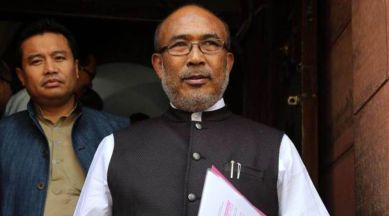Stay updated with the latest - Click here to follow us on Instagram
To check illegal influx from Myanmar, asked Centre to freeze visa-free entry: Manipur CM
FMR allows citizens living along the border on either side to travel up to 16 km inside the other country, without a Visa.

Manipur Chief Minister N Biren Singh said Saturday that the state government has requested the Centre to permanently wind up the Free Movement Regime (FMR) along the Indo-Myanmar border, listing it as one of the steps it is taking to curb “illegal immigration”.
He added that the state is working towards a National Register of Citizens and fencing of the border with Myanmar. Apart from the influx of “illegal immigrants”, Singh suggested this was to crack down on drug trafficking, two things the state government has repeatedly pinned responsibility on for the ongoing conflict.
Since May 3, when violence between Meiteis and Kukis first erupted in Manipur, 175 people have been killed and 1,118 injured, while 32 are missing. The state continues to be on the edge with regular incidents of violence and unrest.
The border between India and Myanmar runs for 1,643 km in the four states of Mizoram, Manipur, Nagaland, and Arunachal Pradesh.
The FMR, a mutually agreed arrangement implemented between the Myanmar and Indian governments in 2018 as a part of the Narendra Modi government’s Act East policy, allows tribes living along the border on either side to travel up to 16 km inside the other country without a visa.
However, the agreement has been defunct since 2020, first because of the Covid pandemic. After the military coup in Myanmar in 2021 and the continued escalation of its refugee crisis, India suspended the FMR in September 2022.
This was subsequently extended in November, with the state Home Department issuing an order stating that it was felt the FMR “may lead to further increase in the number of illegal nationals in India in view of the current law and order situation in Myanmar”.
On Saturday, Singh said the state government has requested a harder line with respect to the agreement and has requested the Centre to permanently withdraw it. “The fire that is burning today isn’t something that started recently,” he said, identifying FMR as one of the key causes for it.
“Since ethnically similar communities live across the borders and, with FMR, people can cross over 16 km on both sides, people have been coming to our side only… I’m saying this openly, that the forces assigned to guard the borders did not do their duty properly. They should have guarded the borders at the borders; instead they were stationed 14-15 km inside from the borders… The Government of Manipur has suspended FMR and has asked the Government of India to also take necessary actions. One by one, all steps would be taken. First being that of NRC; the biometrics have started. Two, border fencing. Three, cessation of FMR,” he said.
The “similar communities” Singh is referring to are the Kukis in Manipur and the Chins in Myanmar, who share a close ethnic relationship. Both the state government and a large section of Meitei civil society allege that a large-scale illegal influx of Chin people from Myanmar, being sheltered in the state’s Kuki-dominated districts, is a trigger for the ethnic turmoil in the state.
Later, speaking to ANI, the CM said: “The Free Movement Regime which was signed between the Indian government and the Myanmar government has been closed till today. We had made a request to the Union Home Minister that because of this Free Movement Regime we are not being able to control the illegal influx from Myanmar. After our request, Union Home Minster through the Home Ministry has closed the FMR.”
The FMR had been conceptualised because India and Myanmar, demarcated by the British in 1826, effectively divided people of the same ethnicity and culture into two nations without seeking their opinion.
Apart from facilitating people-to-people contact, the FMR was supposed to provide impetus to local trade and business. However, it has been criticised for unintentionally aiding illegal immigration, drug trafficking, and gun-running.
The Free Movement Regime, a pact between India and Myanmar, allows tribes living along the border on either side to travel up to 16 km inside the other country without a visa. It has been defunct since 2020.
In the press conference, Singh also stated that the deployment of maximum security in vulnerable areas has significantly reduced incidents of firing and killings. He added that CRPF and BSF personnel have replaced Assam Rifles troops – which have been facing pushback from Meitei civil society – in vulnerable areas such as Narasena, Thamnapokpi, Torbung, and Koutruk.
Since the military coup in Myanmar on February 1, 2021, the ruling junta has launched a campaign of persecution against the Kuki-Chin people. This has pushed large numbers of Myanmarese tribals across the country’s western border into India, especially into Manipur and Mizoram, where they have sought shelter.
Mizoram, where a large section of the population has close ethnic and cultural ties with people across the border, has set up camps for more than 40,000 refugees, despite protests from the Union Ministry of Home Affairs.
Manipur too has received a chunk of illegal migrants over the past year and a half. A committee set up by the state government to identify such migrants recently put their number at 2,187. Last September, 5,500 illegal immigrants were caught in Moreh, and 4,300 were pushed back, sources said. Biometrics of these individuals have been recorded.